If you find yourself in need of heavy machinery for construction, landscaping, or any excavation project, one pressing question often arises: “How much does excavator rental cost?” Renting an excavator can be a cost-effective solution for completing various tasks, but understanding the factors that influence the rental cost is crucial. In this article, we will delve into the key considerations that impact the pricing of excavator rentals, helping you make an informed decision for your specific needs and budget.
Importance of Excavator Rentals
Excavator rentals are the unsung heroes of the construction and landscaping world, offering a cost-effective and flexible solution for projects of all sizes. These versatile machines are crucial in digging trenches, moving heavy materials, and shaping the landscape to meet various project needs. Excavator rentals empower both individuals and businesses, providing them with the capacity to take on ambitious tasks without the burden of ownership.
For smaller landscaping projects, DIY enthusiasts can use mini excavators to create beautiful gardens and water features, making it possible to accomplish complex tasks with precision. Construction companies, on the other hand, can tap into the power of larger excavators to efficiently dig foundations and perform earthmoving operations. The rental market opens up opportunities for countless applications, making it an indispensable resource for anyone in need of excavation services.
Factors Affecting Excavator Rental Costs
Excavator rental costs are not set in stone; they vary depending on several key factors. Understanding these variables is crucial for making informed decisions when it comes to renting an excavator.
1. Excavator Type:
The type and size of the excavator significantly impact the rental price. Mini excavators are more affordable than their larger counterparts, making them ideal for small projects.
2. Rental Duration:
The length of your rental period plays a vital role in cost determination. Daily, weekly, and monthly rates may be available, with longer rentals often leading to cost savings.
3. Attachments:
Excavator attachments, such as buckets, grapples, or hydraulic hammers, can be rented separately, adding to the overall cost.
4. Geographic Location:
Rental costs can vary widely by region, so it’s essential to consider local pricing differences.
5. Excavator Features:
Excavators with advanced features or technology may come at a premium, but they can enhance efficiency and productivity.
6. Additional Costs:
Be aware of potential hidden costs, such as fuel expenses, transportation fees, and operator charges, which can impact your final rental bill.
Understanding these factors helps individuals and businesses make informed decisions about excavator rentals, ensuring that they choose the right equipment at the best possible price for their specific needs. By delving into these factors, you can unlock the secrets of cost-effective excavation, saving both time and money on your projects.
Types of Excavators
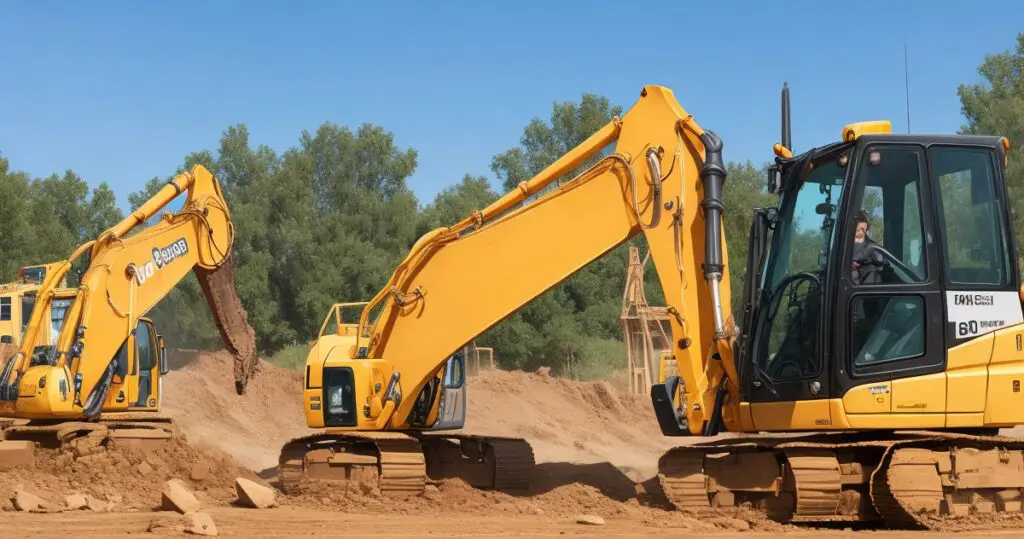
Excavators come in various sizes and configurations, each designed for specific tasks and project requirements. Understanding the different types of excavators is essential when deciding which one to rent for your project.
Mini Excavators
Mini excavators, often referred to as compact excavators, are the smallest in the excavator family. These versatile machines are highly maneuverable and perfect for tasks that require precision and access to tight spaces. Key features and applications of mini excavators include:
1. Compact Size:
Mini excavators are known for their small footprint, making them ideal for urban environments and confined job sites.
2. Versatility:
They can be equipped with various attachments, such as buckets, augers, and hydraulic thumbs, making them suitable for digging, trenching, landscaping, and more.
3. DIY Projects:
Mini excavators are popular among homeowners for landscaping and small excavation projects, offering efficiency and ease of operation.
Standard Excavators
Standard excavators, also known as medium-sized excavators, strike a balance between power and mobility. These machines are a common choice for a wide range of construction and excavation tasks. Key features and applications of standard excavators include:
1. Versatility:
Standard excavators can handle a broad spectrum of projects, from digging foundations to excavating trenches and loading materials.
2. Efficient Power:
Equipped with powerful engines, they are designed for productivity without being overly bulky.
3. Construction Applications:
These excavators are commonly found on construction sites, where their versatility is essential for various tasks.
Large Excavators
Large excavators, often referred to as heavy-duty or full-sized excavators, are the workhorses of the excavation world. These machines are built for heavy-duty tasks and large-scale projects, offering unparalleled digging power and efficiency. Key features and applications of large excavators include:
1. High Capacity:
Large excavators can move significant amounts of material quickly, making them ideal for large excavation and earthmoving projects.
2. Deep Digging:
Their extended reach and digging depth are suitable for tasks like digging deep foundations, mining operations, and quarry work.
3. Industrial Use:
Large excavators are commonly found in industrial applications, such as mining, forestry, and major infrastructure projects.
When considering an excavator rental, it’s crucial to match the type of excavator to the specific needs of your project. Whether it’s a compact mini excavator for a small backyard renovation or a robust large excavator for a massive construction endeavor, understanding the options available will help you make the right choice for your excavation needs.
Rental Options
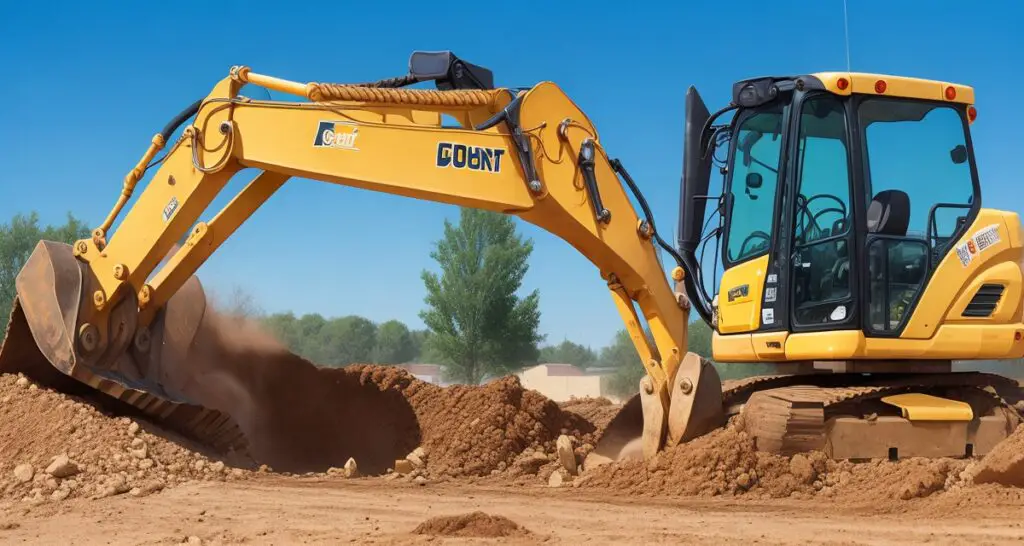
When you’re planning to rent an excavator, you’ll encounter various rental options that cater to different project timelines and budget constraints. Understanding these rental options is essential for making a cost-effective choice that aligns with your project’s requirements.
A. Daily Rates
Daily rental rates offer flexibility for short-term projects and tasks that require the excavator for only a brief period. Here’s what you need to know about daily rates:
1. Short-Term Projects:
Daily rates are ideal for one-time jobs or projects that last for a few days or even just hours, such as small landscaping tasks or emergency repairs.
2. Cost Evaluation:
Calculate the total cost based on the number of days you need the excavator. While daily rates may seem costlier than other options initially, they can be more affordable for short durations.
3. Availability:
Excavator availability is usually higher for daily rentals, as they are in demand for a wide range of tasks.
B. Weekly Rates
Weekly rental rates strike a balance between flexibility and affordability, making them a popular choice for medium-term projects. Here’s what you should consider:
1. Medium-Term Projects:
Weekly rates are suitable for projects that require the excavator for more extended periods, typically spanning a week or a few weeks. This includes construction jobs, landscaping overhauls, and small-scale building projects.
2. Cost Savings:
Opting for a weekly rate often results in a lower per-day cost compared to daily rentals, making it a cost-effective choice for longer projects.
3. Availability:
Availability for weekly rentals may be slightly more limited than daily rentals but still offers reasonable flexibility.
C. Monthly Rates
Monthly rental rates are tailored for extended and large-scale projects that demand ongoing access to an excavator. Understanding monthly rates is crucial for substantial undertakings:
1. Long-Term Projects:
Monthly rates are ideal for projects that span several months or even longer, such as major construction projects, mining operations, and infrastructure development.
2. Cost Efficiency:
Monthly rentals typically offer the most significant cost savings, with a substantially lower per-day rate compared to shorter rental options.
3. Advance Planning:
To secure a monthly rental, it’s essential to plan well in advance, as availability for excavators on monthly terms may be limited.
By carefully considering the rental duration that aligns with your project timeline and budget constraints, you can make an informed decision that maximizes both efficiency and cost-effectiveness when renting an excavator.
Excavator Rental Companies
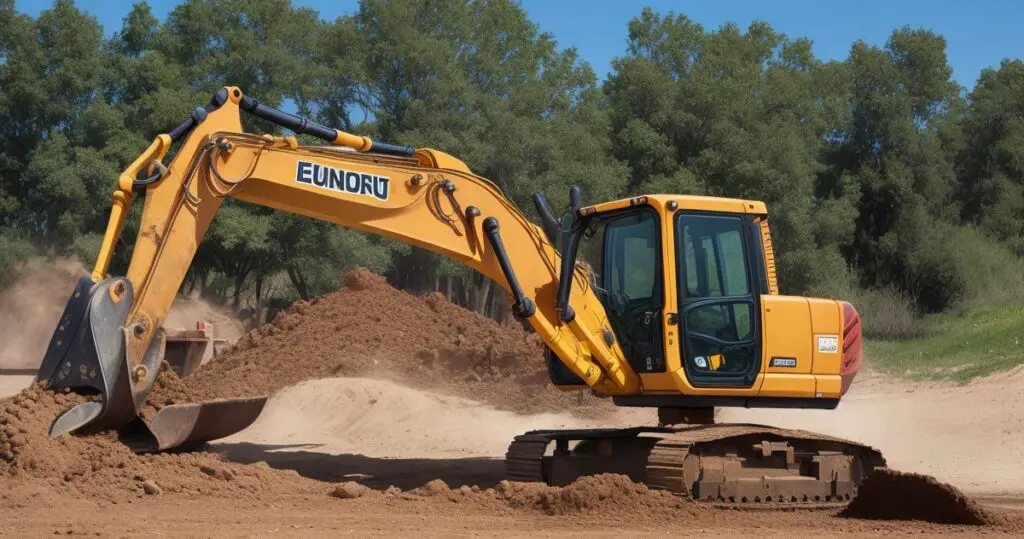
When it comes to renting an excavator, choosing the right rental company is crucial. There are various options available, ranging from large national chains to local rental businesses. Here’s a detailed exploration of your choices:
A. Comparison of Top Rental Companies
1.National Chains:
Well-known national rental companies like United Rentals and Sunbelt Rentals offer a broad range of excavators. They have extensive fleets, providing access to various sizes and models. These companies often have online platforms for convenient booking and a nationwide network of branches, ensuring availability in many locations.
2.Specialized Rental Companies:
Some rental companies specialize in heavy equipment, including excavators. These specialized providers may offer expertise and personalized service tailored to your excavation needs. They often have well-maintained equipment with advanced features.
3.Local Dealerships:
Many local heavy equipment dealerships also offer excavator rentals. While their fleets may be smaller than national chains, they can provide a more personal touch, expert advice, and competitive rates. Supporting local businesses can also be a plus for the community.
4.Online Marketplaces:
Online platforms like EquipmentShare and BigRentz serve as marketplaces connecting renters with equipment owners. They provide a vast selection of equipment, including excavators, and allow you to compare prices and reviews from multiple suppliers.
5.Customer Reviews and Reputation:
When comparing rental companies, consider customer reviews and their reputation for equipment maintenance and customer service. A well-regarded company is more likely to provide a positive rental experience.
6.Pricing Transparency:
Look for rental companies that offer transparent pricing with no hidden fees. Understand the rental terms and conditions, including insurance requirements and security deposit policies, before making a decision.
7.Equipment Availability:
Availability is a critical factor. Ensure that the rental company can provide the excavator you need when you need it. Booking in advance, especially for specific models or during peak seasons, can help secure your equipment.
B. Local Rental Options
1.Convenience:
Local rental options can be highly convenient, as they are often nearby and accessible. You can quickly visit the rental location, inspect equipment, and discuss your project requirements in person.
2.Personalized Service:
Local rental businesses may offer a more personalized and attentive service compared to large chains. They are often familiar with local projects and can provide tailored recommendations.
3.Community Support:
Choosing a local rental company can contribute to the local economy and community. Your rental dollars stay within the area, benefiting local businesses and employment opportunities.
4.Equipment Condition:
Visit the local rental yard to inspect the excavators and ensure they are well-maintained. Local rental businesses often take pride in keeping their equipment in excellent condition.
5.Availability:
While local options may have a smaller fleet, they can still offer a range of excavators. However, availability may be limited during peak seasons, so it’s advisable to book ahead.
6.Price Negotiation:
Local businesses may be more open to price negotiation, especially for long-term rentals. Building a good relationship with them can lead to better deals over time.
When selecting an excavator rental company, weigh the advantages and disadvantages of national chains, specialized providers, local dealerships, and online marketplaces. Consider your project’s scope, timeline, and budget, as well as the level of customer service and equipment quality you require. Ultimately, the right choice will ensure a smooth and successful excavation experience.
Geographic Variations in Costs
HOW MUCH DOES EXCAVATOR RENTAL COST?
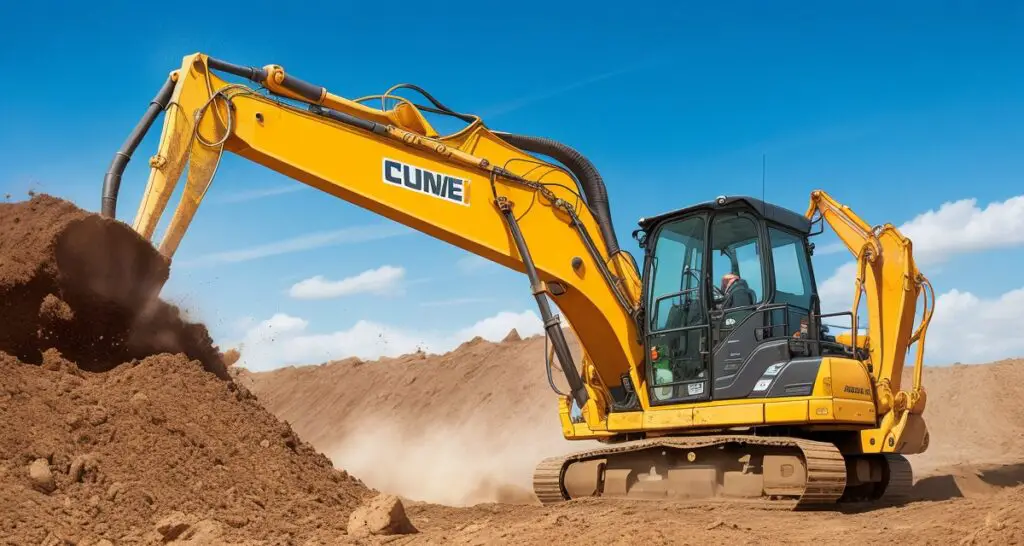
The cost of renting an excavator can vary significantly depending on your location and the nature of the project. Understanding these geographic variations is crucial for effective budgeting and planning. Here’s a detailed exploration of these variations:
A. Regional Price Differences
1.High-Demand Regions:
In regions with high construction and development activity, such as major cities or booming metropolitan areas, rental rates for excavators tend to be higher due to increased demand. The competitive market can drive prices up, making it essential to budget accordingly.
2.Low-Demand Regions:
Conversely, in less densely populated or rural areas with lower demand for heavy equipment, rental rates may be more competitive. Rental companies may offer more competitive pricing to attract customers in these regions.
3.Coastal vs. Inland:
Coastal areas often have higher rental costs due to the proximity to ports and shipping infrastructure. Excavator rentals in inland regions are typically more affordable.
4.Regional Economic Factors:
Economic conditions and development trends in a particular region can also influence excavator rental prices. Booming economies and large-scale infrastructure projects can drive up costs.
5.Seasonal Variations:
Some regions experience seasonal fluctuations in rental rates. For example, in colder climates, excavation work may be more challenging during winter, leading to lower rental rates during this season.
B. Urban vs. Rural Rental Costs
1.Urban Areas:
Excavator rental costs in urban environments are generally higher due to several factors. The cost of doing business, including property and labor, is higher in cities, leading to increased rental rates. Urban projects often require smaller excavators that are in high demand, further contributing to price increases.
2.Rural Areas:
In rural settings, rental costs for excavators are usually more affordable. Lower overhead expenses, reduced demand, and access to larger excavators suitable for rural construction and agricultural projects contribute to lower rates.
3.Accessibility:
The ease of transporting equipment to a location can impact rental costs. Urban areas with congested traffic and limited access may incur higher transportation fees, influencing the overall rental price.
4.Project Scope:
Consider the scope of your project when choosing between urban and rural rentals. Urban areas may offer more convenience but at a higher cost, while rural options provide affordability but may require longer travel times.
5.Local Regulations:
Different regions may have varying regulations and permit requirements for excavation work. Understanding and complying with these regulations can also affect project costs.
6.Market Competition:
In urban areas, there may be more rental companies competing for business, potentially leading to price variations among providers. In rural areas, there may be fewer choices, but prices may be more stable.
When planning your excavator rental, carefully assess the geographic variations in costs. Consider the impact of regional price differences and whether an urban or rural rental aligns better with your budget and project requirements. By doing so, you can make an informed choice that maximizes cost-efficiency while meeting your excavation needs.
Excavator Size and Capacity
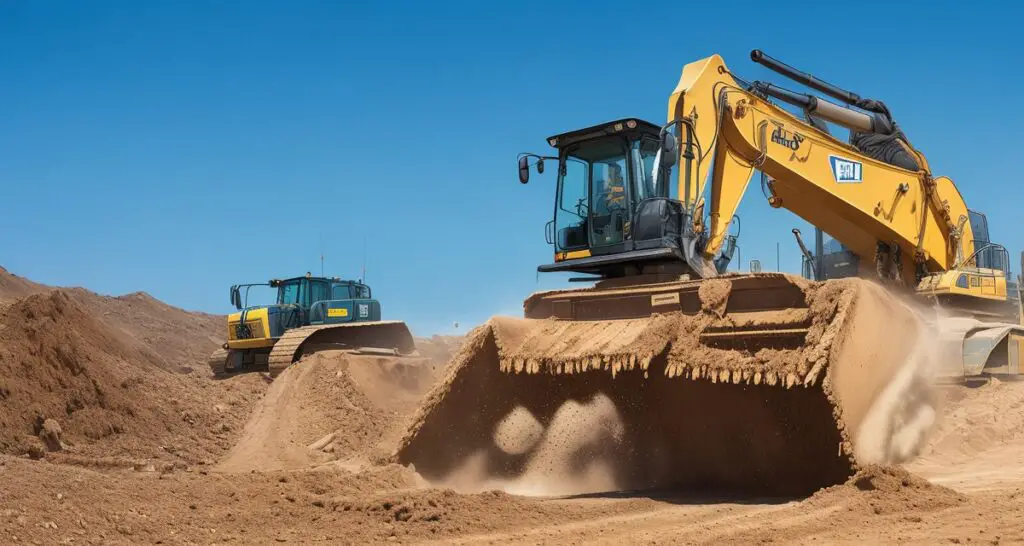
Selecting the appropriate size and capacity of an excavator is a critical decision that directly affects both rental rates and the success of your excavation project. Here’s a comprehensive breakdown of how excavator size and capacity impact your rental experience:
A. Impact on Rental Rates
1.Size vs. Cost:
Excavator size has a direct correlation with rental rates. Larger excavators with higher capacities are generally more expensive to rent on a daily, weekly, or monthly basis. Smaller excavators, such as mini excavators, are usually more budget-friendly.
2.Hourly Fuel Consumption:
Larger excavators tend to consume more fuel per hour compared to smaller ones. This means that not only are the rental rates higher for big excavators, but operating costs, including fuel expenses, also increase.
3.Availability:
The availability of excavators of various sizes can vary by location and rental company. Smaller excavators may be more readily available due to their versatility and demand for a wide range of projects.
4.Attachment Costs:
When renting a larger excavator, consider the Costs associated with attachments like larger buckets or hydraulic thumbs. These attachments can significantly impact the overall rental expense.
B. Choosing the Right Size
1.Project Scope:
The size of your excavation project is a primary factor in determining the right excavator size. For small-scale landscaping or residential projects, a mini excavator may suffice. Larger construction or industrial tasks may require standard or large excavators.
2.Access and Space:
Evaluate the space available at your project site. Tight or confined areas may necessitate the use of a smaller excavator for maneuverability and access.
3.Depth and Reach:
Consider the required digging depth and horizontal reach for your project. Larger excavators have more extensive reach and digging capabilities, making them suitable for deeper excavations.
4.Weight and Ground Conditions:
The weight of the excavator should align with the ground conditions at your site. Heavy excavators may cause damage or sinking on soft or uneven terrain, whereas lighter options are more suitable.
5.Operational Efficiency:
Renting an excavator that matches your project’s requirements can increase operational efficiency. An appropriately sized excavator will complete tasks more efficiently, potentially reducing project duration and costs.
6.Cost-Benefit Analysis:
Weigh the rental cost against the benefits of using a particular size of excavator. While a larger excavator may have a higher rental rate, it can complete tasks more quickly, potentially offsetting the added expense.
7.Consultation:
Seek advice from rental professionals or equipment experts who can assess your project’s needs and recommend the most suitable excavator size and capacity.
Enhancing Excavation Capabilities with Attachments
Excavator attachments gracefully extend the functionality of these versatile machines, playing a pivotal role in shaping the success of your excavation project. Let’s delve into the world of excavator attachments in a refined and genteel manner:
A. Influence on Rental Investment
1.Consideration of Attachment Rental Expenses:
While embarking on the excavator rental journey, it’s prudent to deliberate upon the supplemental costs associated with acquiring attachments. These attachments, available for separate rental, bear variances in pricing contingent on their types and dimensions. It is worth noting that certain attachments, such as hydraulic breakers or augers, may command relatively higher rental fees due to their specialized prowess.
2.Pondering Operational Efficiency:
It is delightful to note that these attachments, while contributing to the overall rental expenditure, serve as benevolent facilitators of operational proficiency. For instance, employing a hydraulic thumb attachment in conjunction with your excavator’s capabilities can bestow upon you the art of graceful material manipulation, potentially culminating in diminished labor outlays and abbreviated project timelines.
3.Catering to Project-Specific Requisites:
Reflecting upon the unique exigencies of your project is an act of refined discernment. Attachments, viewed as prudent investments, embellish the excavator’s aptitude for specific tasks, often validating their Cost in a manner as elegant as a well-crafted symphony.
4.Contemplation of Availability:
The realm of rental is not devoid of fluctuation in availability, especially concerning attachments for diverse excavator sizes. While diminutive attachments, such as buckets, grace you with their ready presence, their more specialized counterparts might necessitate judicious foresight and meticulous reservation.
B. The Tapestry of Common Attachments
1.Buckets:
In the grand tapestry of excavator attachments, buckets emerge as the most ubiquitous and versatile artisans. Exhibiting an assortment of dimensions and contours, these artisans are adept in the arts of excavation, trenching, and material loading. Careful contemplation of the appropriate bucket type, akin to selecting the right brush for an artist, harmonizes with your project’s essence.
2.Hydraulic Breakers:
The hydraulic breakers, often revered as the percussionists of the attachment orchestra, perform the enchanting task of dismantling concrete, stone, and stubborn surfaces. These virtuosos are fixtures in the realms of demolition and construction, where their symphony is an indispensable asset. One must note that the rental rates for hydraulic breakers may harmonize or deviate based on their dimensions and vigor.
3.Augers:
Auger attachments compose an ode to precision and purpose, choreographing the creation of holes in the earth’s canvas for foundations, utility poles, and more. These artful augers are endowed with a pantheon of sizes and bit styles, akin to a palette of brushes, ensuring a perfect match for your project’s canvas.
4.Grapples:
Grapple attachments exhibit the finesse of a maestro, adept at the intricacies of handling bulky, irregular objects, including logs, debris, and scrap materials. These virtuosi elevate material handling to a symphonic performance of grace and efficiency.
5.Rippers:
The ripper attachments, reminiscent of the percussion section in an orchestra, are artisans with a mission to cleave compacted earth and rocky terrain. Their multiple tines or shanks, akin to skilled dancers, elegantly punctuate the ground, rendering them ideal for excavation and land clearance.
6.Tiltrotators:
Tiltrotators, the consummate ballet dancers of the attachment world, offer heightened flexibility and precision. By granting the excavator’s attachment the ability to rotate and tilt, they gracefully execute tasks that demand intricate positioning and artful angling, such as landscaping.
7.Thumbs:
Hydraulic thumbs, akin to gentle yet secure handshakes, excel in the art of gripping and securing materials. These indispensable aides are the maestros in tasks involving the delicate dance of picking up and placing objects, be it landscaping rocks or tree stumps.
8.Compactors:
Compactor attachments, akin to the rhythmic percussion in an ensemble, wield vibratory plates or rollers. Their task is to finesse the art of compacting soil, gravel, or asphalt, making them invaluable in the orchestration of road construction and site preparation projects.
In the realm of excavator attachments, refinement and discernment guide the way. Deliberating upon their impact on rental costs and project efficacy is akin to composing a symphony, where each note contributes to the masterpiece. A tête-à-tête with your rental provider to align your attachment needs with the harmony of your project is the hallmark of a virtuoso’s journey in the world of excavation.
Conclusion;
The cost of excavator rental is a multifaceted consideration influenced by factors such as the type and size of the excavator, rental duration, geographic location, and the inclusion of attachments. To ensure a cost-effective rental experience, it’s essential to research various rental companies, carefully assess your project’s requirements, and factor in Costs like fuel, transport, and operator fees. Negotiation and clear communication with rental providers can also help you secure the best deal for your excavation needs.
Whether you’re embarking on a short-term project or a long-term endeavor, understanding the nuances of excavator rental costs empowers you to make informed decisions that align with your budget and project goals. Keep in mind that the rental landscape may evolve with technological advancements and industry trends, so staying updated on the latest developments can further enhance your rental experience.
FAQS;
What factors influence the cost of excavator rental?
The cost of excavator rental can vary based on several factors, including the type and size of the excavator, the rental duration, your location, and any Attachments or services you require. Larger excavators and longer rental periods typically result in higher costs.
Are there different rental rates for mini excavators compared to standard or large excavators?
Yes, there are different rental rates for mini excavators, standard excavators, and large excavators. Mini excavators are generally more affordable to rent than larger models due to their smaller size and lower operational costs. Standard and large excavators may have higher hourly or daily rates.
How do rental rates for excavators typically break down (e.g., hourly, daily, weekly, monthly)?
Rental rates for excavators are often structured based on usage duration. Common rental rate breakdowns include hourly, daily, weekly, and monthly rates. Hourly rates are suitable for short-term projects, while daily and weekly rates offer cost savings for longer-term rentals. Monthly rates are typically the most budget-friendly for extended projects.
Are there geographic variations in excavator rental costs?
Yes, excavator rental costs can vary significantly by location. Prices tend to be higher in urban areas compared to rural regions due to increased demand and operating costs. Regional economic factors and competition among rental companies can also influence pricing.
Do excavator attachments impact the rental cost, and how much should I budget for them?
Yes, excavator attachments can impact the rental cost. Attachments like hydraulic breakers or specialized buckets may have separate rental fees, and their prices can vary based on type and size. It’s essential to budget for attachments separately when planning your rental.

